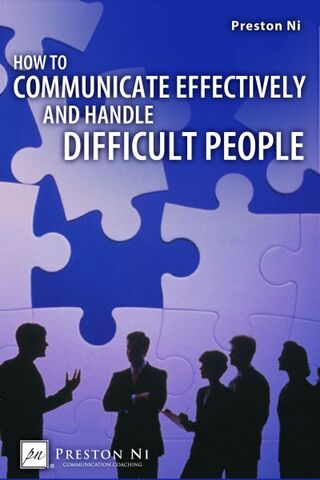Relationships
Are You a Poor Communicator? How to Improve
Stop the damage and improve relationships.
Posted May 5, 2012 Reviewed by Kaja Perina

Author's note: This post is an excerpt from the book: "How to Communicate Effectively and Handle Difficult People".
"Communication – the human connection – is the key to personal and career success."
– Paul J. Meyer
Most of us engage in communication every day. Most of us also know that communicating with others can be a difficult and frustrating experience. There are times when we mean well, but because of the way we say what we say, our message is misunderstood, with unintended and undesirable consequences.
Below are four of the most common mistakes we can make in interpersonal communication, which often lead to conflict and worsening of relationships. The good news is that once we become aware of these poor habits, we can change the way we communicate, resulting in improved relationships.
The four characteristics of ineffective communication
“Trouble comes from the mouth.”
– Chinese Proverb
1. “You” language plus directives
Ineffective communication is often characterized by the use of certain types of “you” language, such as “you are...,” “you should...,” “you need to...,” “you have to...,” “you’d better...,” and “you people...”. Directives are statements that either pass negative judgment or order another person around. Some examples of “you” language plus a directive include:
“You are not good enough...”
“You should pay attention...”
“You need to do this now...”
“You have to understand my position...”
“You better get it right...”
“You people should behave...”
Most people don’t like being judged or told what to do, and when we use “you” language plus directives, it’s easy to arouse in other's feelings of resentment and defensiveness. This type of communication is also problematic in that it tends to invite a “no” response, resulting in disagreements and conflicts.
It's important to note that there are "you" statements that are good for communication. For example, “you-positive” statements are simply sentences that begin with the word “you,” followed by a positive comment (“you did a good job on this project,” “you have a wonderful personality.”). “You-neutral” statements are sentences that begin with “you,” followed by a factual or informative comment (“you’re the third person to arrive,” “you’ll find more information by reading this article.”). In general, there’s nothing wrong with using “you-positive” or “you-neutral” statements. It’s “you-directive” that is ineffective communication.
2. Universal statements
Universal statements are expressions that generalize a person’s character or behavior in a negative way. The most common types of universal statements involve the use of words such as “always,” “never,” “again,” “so,” “every time,” “such a,” and “everyone.” Universal statements are often used in combination with “you” language. For example:
“You always leave the toilet seat up.”
“You never put the toothpaste cap back on.”
“You’re messing up again!”
“You are so lazy!”
“You forget to do this every time!”
“You’re such a slob!”
“Everyone knows that you’re bad.”
Universal statements are problematic in many ways. First, in the mindset of the speaker, there is no possibility of the listener being any other way. The potential to change is discounted. Second, because universals point out “what is wrong,” instead of “how to be better,” such statements actually discourage change. Finally, just as with examples of “you” language earlier, universal statements can easily be disputed. If I say to you, “you never wash the dishes,” all you need to do is to come up with one exception, “that’s not true, Preston, I washed the dishes once last year,” and you have successfully contradicted my statement. The general nature of universal statements makes them very vulnerable to specific counterexamples.
Universal statements are essentially over-generalized, negative judgments. It is especially important to avoid using universals when communicating with children, as such statements can adversely affect their self-esteem.
3. Tough on the person, soft on the issue
In every communication situation involving another person, there are two elements present: the person you are relating to, and the issue or behavior you are addressing. Effective communicators know how to separate the issue or the behavior from the person, and be soft on the person and tough on the issue. Ineffective communicators will do the opposite. They literally “get personal” by being tough on the person, while minimizing or ignoring the issue or the behavior.
For example:
Ineffective communication: “You are so stupid!”
Effective communication: “You’re a smart person, and what you did this morning was not very smart.”
Ineffective communication: “You never clean up. You’re a slob!”
Effective communication: “I noticed that you didn’t wash the dishes this week.”
Ineffective communication: “You are a poor student.”
Effective communication: “You can do well in this class, and I noticed that you got a “C” on your last exam.”
You may have noticed the use of “and” instead of “but” in two of the examples above. “But” is a negator that can discount the significance of what is said before and puts the real meaning of the sentence on what comes after (I like you as a friend, but...). “Yes, but...” often times means “no.” So if you don’t mean to negate the first part of your sentence, use “and” instead of “but.” “And” is a connector which places equal emphasis on both what is said before and after.

Being tough on the person and soft on the issue can easily arouse negative reactions from people, who are likely to take what you’re saying more personally, and as a result feel angry, resentful, hurt or resistant. Note that tough on the person and soft on the issue also involves the frequent use of “you” statements and universals.
4. Invalidate feelings
Invalidation of feelings occurs when we recognize emotions, positive or negative, coming out of a person, and either discount, belittle, minimize, ignore or negatively judge these feelings.
For example:
“Your concerns are meaningless to me!”
“Your complaints are totally unfounded.”
“You’re blowing things way out of proportion.”
“Who cares if you're angry? Stop over-reacting!"
“So what if you got a B in math? I used to get A’s all the time.”
“Don’t feel so happy—your improvement really means very little.”
When a person’s positive feeling is invalidated, her or his positive feeling will likely diminish or disappear. As positive feelings decrease, so does desirable behavior, and the strength of the relationship. When a person’s negative feeling is invalidated, her or his negative feeling will likely intensify and linger. As negative feelings increase, so does undesirable behavior, and barrier in the relationship.
When we invalidate another person’s feelings, we are likely to cause instant resentment. The person (or group) whose feelings we just invalidated is likely to feel hurt and angry. In some cases, a person whose feelings have been invalidated might shut down from you emotionally, so that her/his feelings will not be hurt again. Invalidation of feelings is one of the most destructive things one can do in close, personal relationships. It is one of the main reasons why “fall outs” occur between friends, family, and people in intimate relationships.
Consequences of ineffective communication — fight, flight, and freeze
As stated earlier, ineffective communication causes conflict and worsens relationships. Common reactions to ineffective communication include the three “F”s: people are more likely to either fight an ineffective communicator; take flight from an ineffective communicator, or freeze emotionally (emotionally closed off/shut down) when dealing with an ineffective communicator. The three “F”s, of course, are significant barriers to the development and maintenance of healthy relationships, both at home and at work. They cause suffering to both the sender and recipient of ineffective communication.
"Communication is a skill that you can learn. It's like riding a bicycle or typing. If you're willing to work at it, you can rapidly improve the quality of every part of your life."
– Brian Tracy
For more tips on communication and relationships success, see my books (click on titles):


"How to Communicate Effectively and Handle Difficult People"
"How to Successfully Handle Passive-Aggressive People"
"7 Keys to Long-Term Relationship Success"
© 2012 by Preston C. Ni. All rights reserved worldwide. Copyright violation may subject the violator to legal prosecution.




